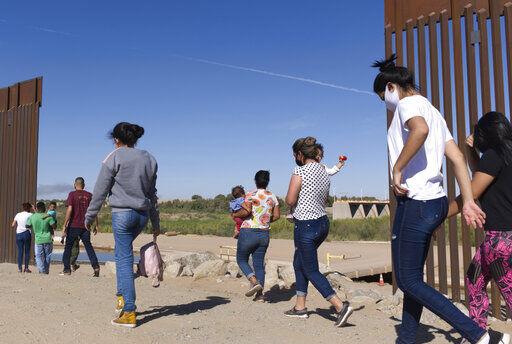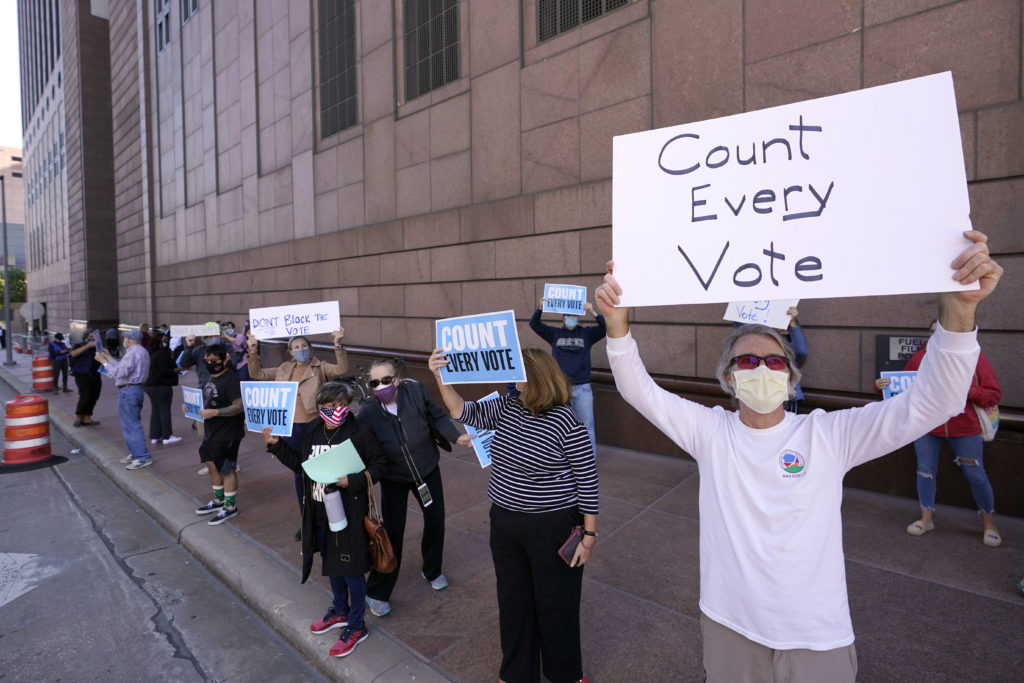Joe Guzzardi: Cartel-enriching border betrayal

Only a handful of insiders realize the true magnitude of the border crisis and its consequences. Those in the know include defanged Customs and Border Protection (CBP) agents, neutered Immigration and Customs Enforcement officials, journalists whose truthful reporting rarely makes national headlines, Department of Homeland Security Secretary Alejandro Mayorkas, and his White House superiors. Otherwise, the dangers that open borders represent are kept tightly under wraps to avoid bad optics. The world, however, knows that accessing the U.S. interior is merely a matter of getting to the border, crossing, and beginning the journey – often White House-aided and abetted – to the final destination for those who enter illegally. In President Joe Biden’s eyes, the world is welcome. In mid-August, for example, CBP caught ten illegal immigrant adults posing as the ubiquitous unaccompanied alien child (UAC). The phony minors, apprehended at Texas’ El Paso Sector, ranged in age from 18 to 26; by law, UACs must not have reached age 18. All were Guatemalans who claimed to be minors to avoid deportation. Days later, at the Del Rio Valley Sector, agents stopped an 18-wheeler crammed with 150 smuggled aliens that included 17 gang members, one sex offender, and one convicted of murder. MS-13 members were among the identified gangsters. This fiscal year, an estimated 130,000 UACs, some self-defined, have entered. The CBP press release on the DRV action concluded vaguely: “All subjects were processed accordingly.” The Coalition Against Trafficking Women, Latin American branch, estimates that 60 percent of Latin American children who embark on a U.S.-bound journey, either alone or with smugglers, are captured by cartels and then forced into pornography or drug trafficking. In addition to enduring a moral nightmare, those migrants who successfully make it to the U.S. interior will have outstanding debts owed to the coyotes and cartels that will take them a lifetime to pay off. To make sure that smuggling accounts are settled, the aliens are forced to wear GPS wristbands so that the cartel can monitor their movements. Cartels are the world’s most powerful criminal organizations and have created the largest form of modern slavery. The New York Times estimated that cartel revenues reached $13 billion this year, up from $500 million in 2018, a 26x increase in fewer than five years. Over the years, illegal immigration has reached such extraordinarily high levels that it begat more illegal immigration. Decades of porous borders, inadequate interior enforcement, and the current welcoming environment have facilitated today’s historic and continuous wave. In 2018, during interviews in Guatemala’s tiny 17,000 residents-strong Concepción Chiquirichapa, reporters learned that almost everyone has family or knows someone with a family in the U.S. Think about what that amazing statistic conveys: individuals thousands of miles away from Los Angeles, Chicago, and New York, and with few transportation options in their remote villages, have departed for the U.S., confident that they’ll get in, and will remain indefinitely. But neither unlawfully present parents nor their children who are joining them, trafficked or not, deserve a free pass from the Biden administration. In previous UAC waves, 60 percent of the children were handed over to illegally residing parents. U.S. District Judge Andrew Hanen, in the Southern District of Texas, wrote of several instances in which parents “initiated the conspiracy to smuggle minors into the country illegally,” a reference to contracting with traffickers. Then, Hanen continued, instead of enforcing immigration laws, “DHS completed the criminal conspiracy…by delivering the minors into the custody of the parent living illegally in the United States.” Hanen’s message: Nonenforcement encourages parents to pay coyotes to bring their minor children north. UACs will continue to flock to the border as long as their illegal alien U.S. families can criminally bring their children to the U.S. without concern for their own removal. Judge Hanen’s criminal conspiracy allegation is tough talk but accurate. And with the entire U.S. a sanctuary nation, nonenforcement’s failures, and the fallout are painfully obvious. Joe Guzzardi is a nationally syndicated newspaper columnist who writes about immigration and related social issues. Joe joined Progressives for Immigration Reform in 2018 as an analyst after a ten-year career directing media relations for Californians for Population Stabilization, where he also was a Senior Writing Fellow. A native Californian, Joe now lives in Pennsylvania. Contact him at jguzzardi@pfirdc.org.
Judge rejects GOP effort to throw out 127,000 Houston votes

A federal judge on Monday rejected another last-ditch Republican effort to invalidate nearly 127,000 votes in Houston because the ballots were cast at drive-thru polling centers established during the pandemic. The lawsuit was brought by conservative Texas activists who have railed against expanded voting access in Harris County, where a record 1.4 million early votes have already been cast. The county is the nation’s third-most populous and a crucial battleground in Texas, where President Donald Trump and Republicans are bracing for the closest election in decades on Tuesday. U.S. District Judge Andrew Hanen’s decision to hear arguments on the brink of Election Day drew concern from voting rights activists and came after the Texas Supreme Court rejected a nearly identical challenge over the weekend. “We cannot allow participation to be limited simply because there are those who choose to think that they have the ability and the authority to decide who votes,” Democratic Rep. Al Green, of Houston, said outside the courthouse after the ruling. “It’s the Constitution that determines who votes.” Hanen said those who oppose drive-thru centers — who were represented by former Harris County GOP Chairman Jared Woodfill— had no standing to bring a lawsuit. He added that people had already voted and that conservative activists had months to bring a challenge sooner. But Hanen still expressed doubts about whether Texas law allowed anyone to vote from their car, even during a pandemic. “I would not vote in a drive-thru just out of my concern as to whether that’s legal or not,” Hanen said. After Hanen’s ruling, Woodfill accused Harris County officials of using their office to help Democrats win Tuesday. “If Harris County goes against Trump in large enough numbers, then we could lose Texas. And if Trump loses Texas then we lose the national election,” Woodfill said after the ruling. “As far as I’m concerned, this is ground zero.” Late Monday, Woodfill filed an appeal with the 5th U.S. Circuit Court of Appeals, seeking an emergency injunction to invalidate the ballots cast curbside. The appeals court did not rule immediately. Another 20,000 or more voters were expected to use drive-thru polling locations Tuesday, said Harris County Clerk Chris Hollins, the county’s top elections official. Several voters who already used the drive-thru centers rushed to join mounting opposition to the lawsuit, including a Houston attorney whose wife was 35 weeks pregnant when she cast her ballot. She gave birth to twins Friday. “My vote counts,” David Hobbs said. “My wife’s vote counts.” Trump won Texas by nine points in 2016 but polls have shown Democrat Joe Biden still within reach in America’s biggest red state. Democrats also need to flip only nine seats to reclaim a majority in the Texas House for the first time in 20 years, and have aggressively targeted several races in Harris County. Woodfill has been a part of a battery of court challenges over moves to expand voting options during the COVID-19 pandemic. The challenges have not involved Trump’s campaign. Harris County offered 10 drive-thru locations as an option for its nearly 5 million residents amid worries of spreading the coronavirus. Woodfill argued that Texas election law makes no explicit allowances for drive-thru voting and framed it is as an unlawful expansion of curbside voting, which is legal in Texas but limited to people who are unable to enter polling places because of their health. Portions of the hearing were consumed by debate over what exactly qualified as a legal structure for a polling place under Texas law. “You have a fundamental right to vote in a car?” Hanen tersely asked an attorney for the ACLU. Woodfill’s lawsuit noted that all but one of the drive-thru centers were set up “in Democrat areas of the county.” More than 40% of Harris County residents are Latino, and about one in five residents are Black. The lawsuit drew objections even from Republicans, including former Texas House Speaker Joe Straus. Republican Sen. John Cornyn, who is facing the toughest reelection battle of his career Tuesday against Democrat MJ Hegar, also said during a weekend campaign stop that the Texas Supreme Court made the right decision earlier in rejecting an identical challenge. The Texas Supreme Court, which is controlled entirely by Republicans, rejected an identical lawsuit last month and on Sunday refused to invalidate the votes already cast. The state’s highest court did not explain its decision. Hollins had asked Republican Gov. Greg Abbott to affirm that the drive-thru locations are legal but received no response. Texas is one of just five states that did not allow for widespread mail-in voting this year during the coronavirus pandemic, which has killed more than 18,000 people statewide. Abbott instead expanded early voting by one week, and that extra time helped Texas already surpass 2016’s total votes even before Tuesday’s election. More than 9.7 million people have cast early ballots in Texas, where turnout typically ranks among the lowest in the country. Some elections experts predict that total turnout in Texas could surpass 12 million, and Harris County officials have taken more steps than most to expand voting access. The county tripled the number of polling places and last week had eight locations that stayed open for 24 hours. Republished with the permission of the Associated Press.


